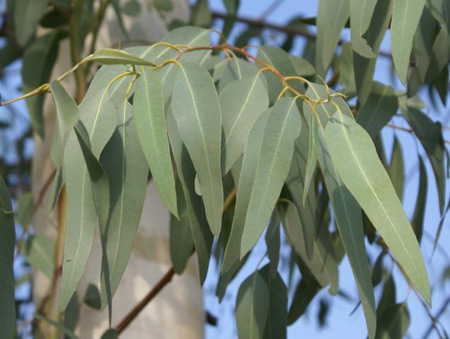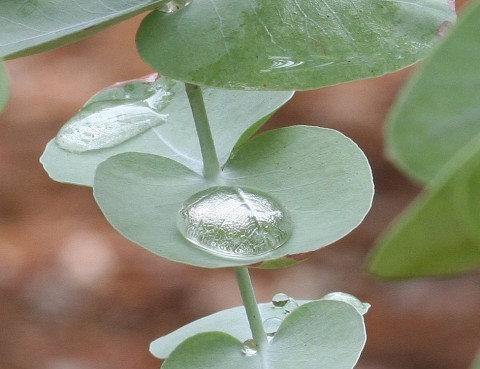The eucalyptus is an attractive evergreen tree with bluish-green leathery leaves which are full of glands containing a fragrant volatile oil. It is indigenous to Australia and Tasmania where it can attain a height of 375 feet (112 metres), ranking one of the largest trees in the world. There are hundreds of species, but the one used medicinally has the highest proportion of eucalyptol (cineole) in its essential oil.
Herbal remedy
Eucalyptus is a traditional Aboriginal remedy for fevers and infections as it is a highly antiseptic febrifuge. The volatile oils in the leaves stimulate the circulation, enhancing blood flow to the skin and causing sweating. This process clears toxins from the blood, lowers fever and pushes out eruptions, speeding resolution of eruptive fevers such as chickenpox and measles. It was an old folk remedy for typhoid and scarlet fever, remittent fevers, malaria and cholera. It also makes an excellent decongestant and expectorant. It is used for colds, flu, croup, coughs, asthma and chest infections such as whooping cough, pneumonia and bronchitis, for catarrh, sinusitis and ear infections. It is best taken at the onset of symptoms such as sore throat, aches and pains, feverishness and malaise.
Russian research on eucalyptus species has shown some to be effective antiviral remedies while other are antimalarial or highly antibacterial.
In Chinese medicine decoctions of the leaves are used for pulmonary tuberculosis. The dried leaves also used to be smoked for asthma. They are burnt in South American countries to purify the atmosphere. A decoction of the leaves in hot water can be used for fumigation, to cleanse the air of infection in the sick room, or during a flu epidemic. A decoction kept simmering in a pot all day will continually disinfect the air and prevent the spread of contagious diseases.
In China eucalyptus leaves are taken in decoction to treat aching joints. The herbal oil is applied externally as a rubbing oil for painful inflamed joints in arthritis and gout, to relieve neuralgia, and when applied to the temples for headaches and migraines.
In our grandmothers’ day eucalyptus was made into wine and used as an aperitif and digestive. Its antiseptic properties are exerted throughout the digestive tract and when taken in decoction eucalyptus leaves were used for bacillary dysentery, typhoid, diarrhoea and vomiting. The gum and tannins in the leaves have an astringent action, also useful in resolving diarrhoea, dysentery and to check bleeding. The volatile oils from the leaves are excreted via the urinary system so that a decoction will relieve infections such as cystitis and pyelonephritis. Recent research suggests that eucalyptus may lower blood sugar.
Externally, eucalyptus can be used as an antiseptic and to speed healing, applied in compresses to wounds, burns, ulcers, boils and abscesses. It will stop bleeding of cuts and abrasions and promote tissue repair. A fluid extract diluted in a little water was a folk remedy for nosebleeds. In traditional Aboriginal medicine eucalyptus leaves were used in poultices for wounds and inflammation. A decoction of the leaves can be used as a gargle for sore throats and as a mouthwash for infected gums, thrush and mouth ulcers. It also makes an effective douche for vaginal discharges and infections such as thrush, and a wash for haemorrhoids.
Aromatherapy oil
The oil obtained by steam distillation of eucalyptus leaves is an excellent natural antiseptic. Dr Jean Yalnet (the well-known French doctor who has written extensively about aromatherapy) reports that 2 percent dilution spray will kill 70 percent of airborne staphylococci and still recommends it for treatment of cholera, malaria, typhoid, as well as scarlatina, measles and flu.
Externally, the dilute oil is useful for cold sores, shingles, chickenpox and other skin infections, as well as inflammatory complaints such as boils, chilblains, and varicose ulcers. It also makes a good insect repellent.
Since the actions of the herbal remedy are mostly attributed to the high volatile oil content, the use of eucalyptus oil in aromatherapy very much resembles its herbal action. It increases circulation, promotes sweating and thereby relieves fevers. Used as an inhalant it is an exceptional decongestant, clearing the airways of phlegm — useful in colds, flu, sinus congestion, headaches, chest infections and asthma.
Applied locally, eucalyptus oil increases circulation and has anaesthetic properties. It is good for aching muscles, sprains, arthritic and rheumatic pain, especially when combined with rosemary, lavender or marjoram oil. It promotes urination and relieves urinary infections such as cystitis. It enhances the digestion and relieves diarrhoea and is useful to diabetics as it can lower blood sugar levels. Its stimulating properties aid concentration, invigorating and refreshing both mind and body.
Homeopathic remedy: Eucalyptus
Eucalyptus is similarly prescribed for acute infections, including malaria, typhoid and influenza. It is used both preventatively and curatively. Eucalyptus will relieve fevers particularly if they are intermittent, eruptive infections such as measles and scarlet fever, as well as catarrhal conditions throughout the body and congestive headaches. It is indicated for asthma with thick phlegm, bronchitis, whooping cough, emphysema, and for sore throats and enlarged, ulcerated tonsils.
The remedy can also be given for gastric and intestinal conditions, particularly where there is sluggish digestion giving rise to dyspepsia, offensive wind and an empty feeling in the stomach. Gastric pain is relieved by eating. It is excellent for acute diarrhoea, and dysentery with colic, blood and mucus discharge in the stools, with a feeling of heat in the rectum.
In the urinary system, symptoms indicating eucalyptus include blood in the urine, spasmodic stricture of the urethra, pain on urination and when urine has the odour of violets. It is given for acute nephritis as a complication of flu.
The homeopathic remedy is also prescribed for stiff and painful joints, pain in the limbs on walking, stiff weary feelings, gout and pricking sensations in the muscles followed by painful aching. Herpes and varicose ulcers also respond well to it. Eucalyptus is given for those feeling tired and sluggish, in mind and body, often a consequence of chronic catarrh in the head. Such people have a desire for exercise, and their symptoms tend to be worse at night.
The flower essence
Eucalyptus is said to have a liberating effect, helping one to accept life as it is.

